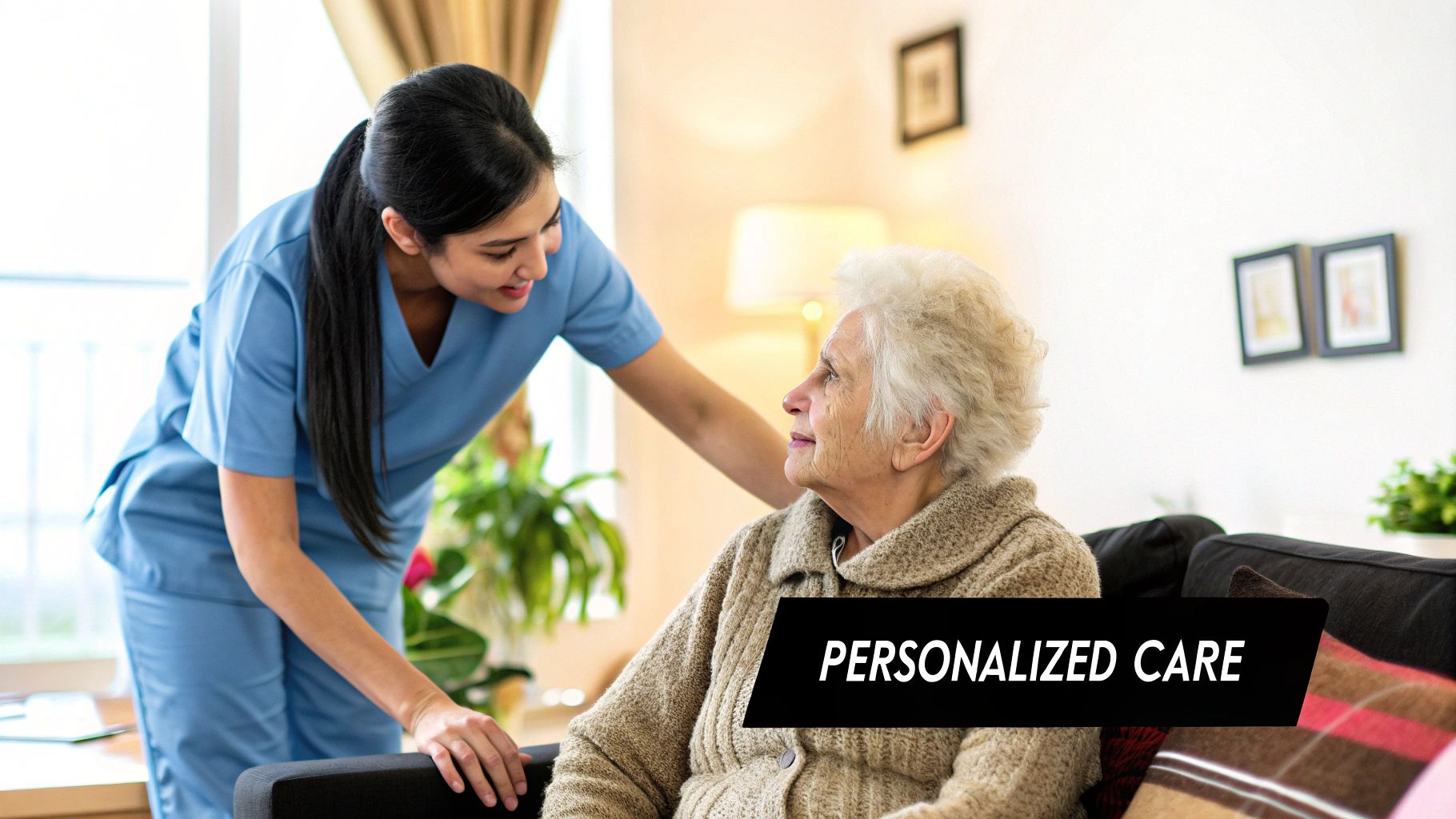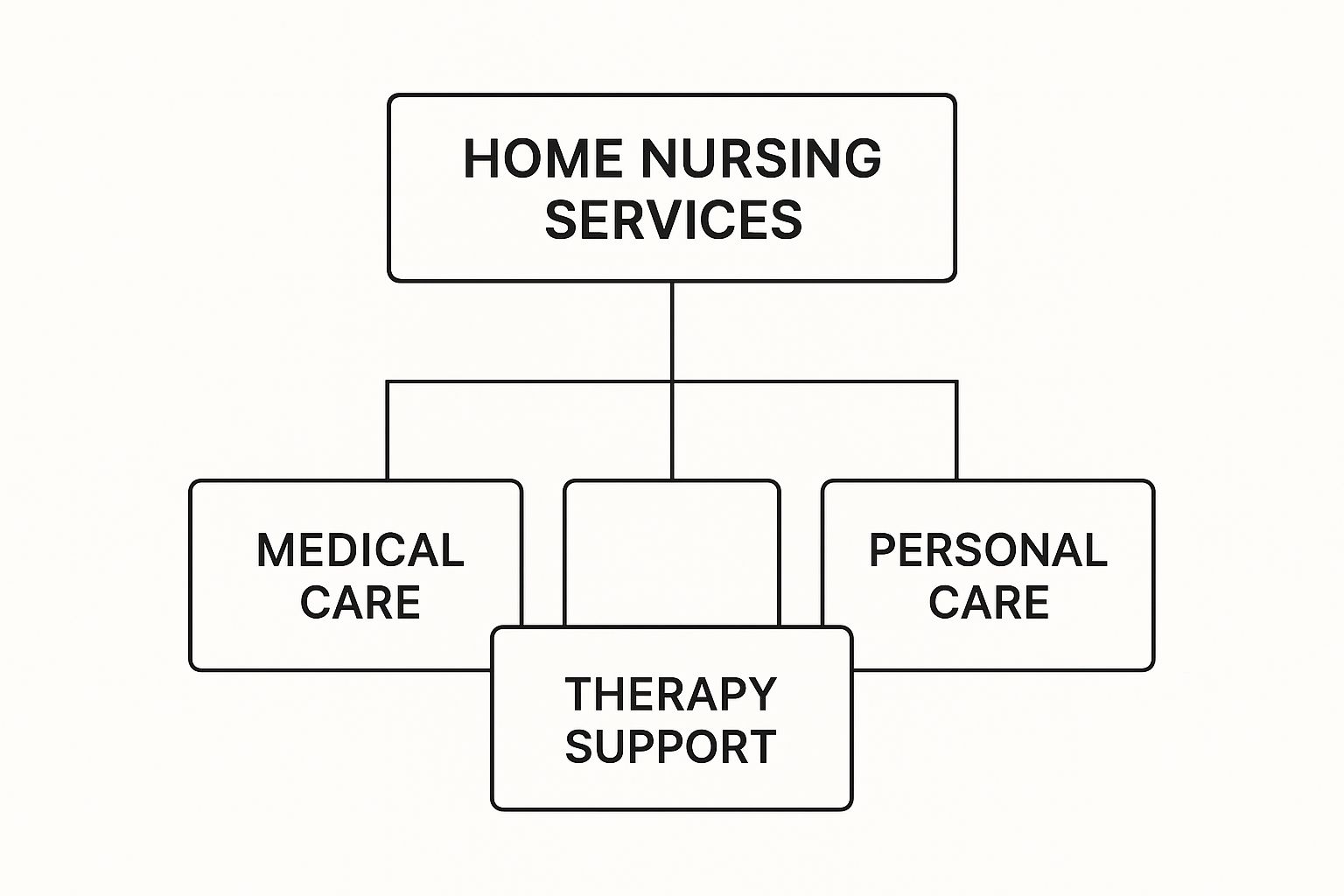When a loved one faces a health challenge, whether it’s recovering from surgery or needing daily support for an elderly parent, navigating the path forward in Dubai can feel overwhelming. Home nursing in Dubai offers a professional, personal, and reassuring alternative to prolonged hospital stays, bringing skilled medical care directly to the comfort and familiarity of your home. It’s about ensuring your family member receives expert attention in a place where they feel most relaxed, which can significantly improve recovery and well-being.
Your Guide to Compassionate Home Nursing in Dubai
Deciding on the right care for a family member is a critical choice. The term "home nursing" might suggest basic assistance, but within Dubai's world-class medical landscape, it represents comprehensive, clinical care delivered by a licensed nurse in a patient's own residence.
This isn't just about convenience; it’s about creating an optimal healing environment. Imagine a loved one recovering after surgery. Instead of a sterile hospital ward, they are in their own bed, surrounded by the people and comforts they know. This familiar setting is a powerful, often underestimated, part of the recovery process and frequently leads to faster, better health outcomes. Professional home nursing Dubai services effectively bridge the gap between hospital discharge and regaining full independence.
What Does Home Nursing in Dubai Truly Involve?
At its core, home nursing is about one-on-one medical attention, completely personalised to an individual's specific health requirements. This care ranges from complex clinical tasks like post-operative wound care to the supportive assistance that helps maintain dignity and a high quality of life. The goal is to integrate a seamless healthcare experience into your daily routine, rather than disrupting it.
Before we dive deeper, let’s get a quick snapshot of what you can expect.
Home Nursing in Dubai at a Glance
This table breaks down the core elements of professional home nursing to give you a clear idea of how these services can support your family in Dubai.
| Service Aspect | What It Means for Your Family |
|---|---|
| DHA-Licensed Nurses | Your loved one is cared for by a qualified professional, ensuring medical safety and adherence to Dubai's standards. |
| Personalised Care Plans | Care is tailored to your family’s schedule and the patient’s specific health needs—not a generic hospital routine. |
| Post-Operative Care | Provides crucial support like wound dressing, pain management, and monitoring after surgery, right at home. |
| Elderly Care | Helps seniors with daily activities, medication management, and mobility, promoting independence in a familiar setting. |
| Chronic Disease Management | Offers consistent monitoring for conditions like diabetes or hypertension, helping to prevent complications. |
| Family Education & Support | Nurses empower you with the knowledge to support your loved one, making you a confident part of the care team. |
Ultimately, this level of care is about creating a supportive partnership that puts the patient's well-being first.
So, what are the key pillars of this service?
- Skilled Medical Care: All services are provided by nurses licensed by the Dubai Health Authority (DHA). They are equipped to manage medications, dress wounds, monitor vital signs, and handle a wide range of other clinical duties.
- Personalised Care Plans: Forget the one-size-fits-all approach. Home nursing plans are carefully crafted around the patient's unique condition, daily schedule, and personal preferences.
- Family Support and Education: The nurse doesn't just care for the patient; they become a resource for the entire family, guiding you on how to provide effective support.
Home nursing is more than a medical service. It’s a partnership between the nurse, the patient, and their family, working together in a supportive home environment to achieve the best possible health outcome.
This guide will walk you through every aspect of home nursing care in Dubai. We'll cover everything from the key benefits and different types of services to understanding costs and choosing the right provider. By the end, you'll have all the information needed to make a confident decision for your family.
The True Benefits of In-Home Nursing Care

Healthcare is deeply personal. When families in Dubai opt for in-home nursing care, it’s often because they seek comfort, dignity, and a sense of normalcy during a challenging time. It’s not just about convenience; it’s about creating a healing space right where it matters most—at home.
The psychological comfort of being in your own space is immense. While hospitals are essential for critical care, they can feel sterile and impersonal. At home, you’re surrounded by familiar things that keep you grounded. This familiarity is a powerful tool against the stress and anxiety that can negatively impact physical recovery.
This is especially true for elderly patients or those managing a long-term illness. A stable, predictable environment is key. Receiving care at home allows them to retain their independence and have a say in their daily lives, which is fundamental to their overall well-being.
Personalised and Uninterrupted Attention
In a busy hospital, a nurse’s attention is often split between multiple patients. The model for home nursing Dubai services is fundamentally different. It’s built around one-on-one care, meaning your loved one gets the nurse's full, undivided attention.
This dedicated focus allows the nurse to build a genuine connection with the patient. They learn their unique needs, personal preferences, and can spot subtle changes in their condition that might otherwise be missed. The result is a highly personalised care plan that can be adjusted in real-time.
The real magic of in-home nursing is the shift from standard hospital routines to a truly patient-first approach. The care revolves around the individual, not the institution's timetable.
This personal bond doesn't just improve medical outcomes; it provides incredible emotional support. For both the patient and the family, knowing a dedicated professional is consistently there brings a profound sense of peace of mind.
Enhanced Safety and Family Convenience
One of the most practical benefits of home nursing is a lower risk of exposure to hospital-acquired infections (HAIs). Hospitals, by their nature, are environments where germs can spread. Recovering at home creates a much safer healing space, particularly for patients with weakened immune systems.
For families, the convenience is a game-changer. Home nursing eliminates stressful, time-consuming daily trips to a hospital. This frees up family members to focus on providing love and emotional support, not managing logistics. Life can continue with a greater sense of normalcy for everyone involved.
The demand for these services is skyrocketing in the UAE. The home healthcare market's rapid growth demonstrates how much families value this type of in-home medical support. This growth is also fueled by initiatives making home care more accessible, so more families can benefit from these personalised nursing services at home.
Empowering Patient Dignity and Independence
Ultimately, the goal of quality healthcare is to improve a person’s quality of life. This is where home nursing truly shines—it empowers patients to live with dignity. For someone recovering from surgery or managing a chronic condition, staying in their own home is a powerful way to remember who they are beyond their illness.
This model fosters independence in several key ways:
- Maintaining Routines: Patients can stick to their own schedules for meals, sleep, and socialising.
- Active Participation: Nurses can work with patients in their own environment to practise daily activities, helping them regain skills and confidence.
- Family Involvement: Care becomes a team effort, allowing family members to be actively involved in a comfortable setting.
This approach means that medical care fits into the patient's life, not the other way around. It’s a compassionate, effective solution that aligns with Dubai's world-class healthcare standards.
Matching Your Needs to the Right Nursing Service
When you're looking for home nursing in Dubai, it's important to remember you're choosing a specialised form of care. Just as you'd see a cardiologist for a heart condition, home nursing offers a spectrum of services designed for specific health situations.
Figuring out which type of care fits your family's needs is the first step toward getting the most effective support possible.
This diagram shows how home nursing services are typically structured, blending medical, personal, and therapeutic support into one seamless package.

As you can see, comprehensive care is about more than just clinical tasks. It’s about creating a well-rounded support system that includes personal assistance and specialised therapies, all working together to maintain a person's health and quality of life at home.
To help you decide, let's take a closer look at the different types of nursing care available.
Post-Operative Care at Home
Recovering from surgery is a delicate process. Professional oversight during this phase can make all the difference, bridging the gap between hospital discharge and a full, safe recovery. This service is ideal for patients who've had procedures ranging from orthopaedic surgery to more complex operations.
A nurse specialising in post-operative care will focus on:
- Expert Wound Management: This involves more than just changing a bandage. They clean the incision site, apply sterile dressings, and monitor for any signs of infection.
- Effective Pain Control: The nurse ensures pain medication is administered on schedule, assesses the patient’s comfort level, and collaborates with the doctor to adjust the pain management plan.
- Mobility Assistance: They safely help the patient with movement and prescribed exercises, which is vital for preventing complications like blood clots.
This dedicated attention not only prevents post-surgical issues but also brings incredible peace of mind.
Elderly Care or Geriatric Nursing
As our loved ones age, they often face health challenges that make independent living difficult. Geriatric nursing helps seniors maintain their dignity, safety, and quality of life in the comfort of their own homes. For many families in Dubai, it's a lifeline that provides excellent care without considering a residential facility.
If you'd like to dive deeper into this, we have a complete article on finding the right elder care at home in Dubai.
Geriatric nursing is fundamentally about enabling independence. It focuses on what a senior can do, providing the right support to help them live a fulfilling life safely.
Services often include medication management, assistance with daily activities like bathing, fall prevention strategies, and companionship to combat loneliness.
Chronic Disease Management
Living with a long-term condition like diabetes, hypertension, or COPD requires constant management. Home nursing offers consistent, professional support to handle these conditions effectively, helping to prevent flare-ups or hospitalisations.
A nurse specialising in chronic disease management becomes a vital part of the patient's healthcare team. Their role includes:
- Regular Monitoring: Checking vital signs, blood sugar levels, or respiratory function to track the condition.
- Medication Adherence: Ensuring all medications are taken correctly and on time.
- Patient Education: Teaching the patient and family about the condition, including important diet and lifestyle changes.
This proactive approach empowers patients, giving them the tools and confidence to manage their health.
Maternal and Newborn Support
The weeks after childbirth are a beautiful but often overwhelming time. Postnatal home nursing provides new mothers and their babies with professional medical support during this critical period, helping the whole family transition smoothly.
A postnatal nurse can assist with everything from newborn care—like bathing and feeding—to monitoring the mother's physical and emotional recovery. They offer invaluable breastfeeding support and the reassurance new parents need.
This support ensures both mother and baby get the best possible start together.
Comparing Home Nursing Specializations
To make things clearer, let's break down the key differences between these care types. Understanding these distinctions will help you select the most appropriate service.
| Type of Care | Ideal for Patients Needing | Key Nursing Responsibilities |
|---|---|---|
| Post-Operative Care | Support after surgery, from minor procedures to major operations. | Wound care, pain management, mobility assistance, infection monitoring. |
| Geriatric Care | Assistance with age-related conditions and daily living activities. | Medication management, fall prevention, companionship, chronic illness support. |
| Chronic Disease Management | Ongoing support for conditions like diabetes, COPD, or hypertension. | Vital signs monitoring, patient education, medication adherence, lifestyle coaching. |
| Maternal & Newborn Support | Help for new mothers and infants in the first few weeks after birth. | Newborn care, breastfeeding support, monitoring mother's recovery, parent education. |
Each specialisation plays a unique role, but they all share the goal of delivering high-quality, compassionate medical care in the comfort of a patient's home.
Understanding the Cost of Home Nursing in Dubai

When exploring care options, cost is a primary consideration. Understanding the cost of home nursing in Dubai is key to making a confident decision, and the pricing is typically flexible rather than a fixed number.
Think of it as a custom care package. The final cost is shaped by several key factors, ensuring you only pay for the exact level of support your loved one needs. This approach makes professional in-home care more accessible and prevents you from paying for unnecessary services.
The main influences on price are the nurse’s skill level, the duration of care, and the complexity of the patient's medical needs. Understanding how these elements fit together allows you to budget effectively.
Key Factors That Determine the Cost
Home nursing providers in Dubai generally have a transparent cost structure that reflects the expertise and resources required. Let's break down the key factors.
Level of Medical Skill: A Registered Nurse (RN) with specialised experience in post-operative recovery or chronic illness management will have a higher rate than a Practical Nurse (PN) or healthcare assistant focused on personal support.
Duration and Frequency of Care: The total cost is directly linked to the amount of time a nurse spends with the patient. Most agencies in Dubai offer flexible scheduling, from hourly rates to 12-hour day or night shifts and even 24-hour live-in care packages.
Complexity of Patient Needs: A patient requiring intensive medical support—like ventilator assistance, intravenous (IV) therapy, or advanced wound care—will need a more specialised and therefore more costly care plan than a patient who primarily needs monitoring and medication reminders.
This dynamic pricing ensures the care plan is both medically appropriate and financially sensible.
Navigating Insurance Coverage
A common question is whether health insurance covers home nursing. The answer depends on your specific policy and whether the care is deemed medically necessary. Many insurance plans in Dubai do offer benefits for home healthcare, especially when prescribed by a doctor as part of a treatment plan.
To determine your coverage, follow these steps:
- Review Your Policy: Look for terms like "home healthcare," "in-home nursing," or "post-hospitalisation care."
- Contact Your Insurer: Speak directly with a representative to confirm benefits, ask about limits, and understand the pre-approval process.
- Obtain a Doctor's Prescription: Nearly all insurers require a formal recommendation from a physician outlining why home nursing is a medical necessity.
"Navigating insurance can feel daunting, but it's a critical step. Always get pre-authorisation from your provider before starting services to ensure a smooth, stress-free financial experience."
The demand for these services is growing rapidly. In 2024, the UAE's home healthcare market was valued at an estimated USD 1.66 billion and is projected to reach USD 3.01 billion by 2032. This incredible growth highlights how much families rely on skilled medical support at home.
For more helpful articles and insights into healthcare, feel free to explore the other topics on our blog. Understanding your options is the first step toward making empowered decisions.
How to Choose the Right Home Nursing Provider
Choosing a home nursing provider is a significant decision. You are inviting a medical professional into your home to care for a loved one. To make the right choice, you need to look beyond marketing and focus on what truly matters: credentials, compassion, and reliability.
Think of this process as finding a trusted partner for your family's health. It requires some due diligence—checking licenses, understanding their care philosophy, and ensuring their safety standards are impeccable.
Start with the Non-Negotiables
Before comparing agencies, verify these essential criteria. Any provider you consider must have these in place.
Dubai Health Authority (DHA) Licensing: This is your number one checkpoint. A DHA license confirms the agency meets Dubai's strict standards for safety, quality, and ethics. Never consider an unlicensed agency.
Qualified and Vetted Nursing Staff: Inquire about the qualifications of their team. Are they Registered Nurses (RNs) with individual DHA licenses? Ask about their background check process to ensure every nurse is thoroughly vetted.
Clear Emergency Protocols: What is the plan for a medical emergency? A professional service will have a clear procedure for when to call the family, when to call an ambulance, and the immediate steps the nurse will take.
These three points are your initial filter. If an agency is hesitant to provide this information, it's a major red flag.
Your peace of mind starts with confirming the credentials. A reputable home nursing provider will be transparent and proud to share their licensing, staff qualifications, and safety procedures with you.
Essential Questions for Your Shortlist
Once you have a list of qualified providers, it's time to find the right fit. Use these questions during your consultations to find an agency that aligns with your family's needs and values.
What is your process for creating a care plan? A good agency will use a collaborative approach, working with you, the patient, and the doctor to create a personalised plan, not a generic template.
How do you match a nurse to a patient? A great match goes beyond clinical skills. Do they consider personality, communication style, or language to ensure a comfortable, trusting relationship?
What kind of ongoing training do your nurses receive? Medicine is constantly evolving. A top-tier provider invests in continuous training to keep their staff updated on the latest medical practices.
Can we meet the proposed nurse before we commit? This is a reasonable request. Meeting the caregiver beforehand can make all the difference in feeling confident about your decision.
Evaluating Reputation and Contracts
In a field built on trust, reputation is paramount. Read online reviews and testimonials, and don't hesitate to ask for references. Look for patterns in feedback regarding communication, reliability, and the compassion of the nurses.
The home healthcare market is a significant sector in the region. The Middle East home healthcare market was valued at USD 6.12 billion in 2024 and is projected to reach USD 11.80 billion by 2033. With around 9,890 home healthcare providers in the UAE, you have many choices, making careful vetting even more critical.
Finally, read any contract thoroughly before signing. Ensure it clearly states the services included, costs, schedule, and policies for cancellations or changing caregivers. By taking these steps, you can confidently find trusted and compassionate home nurses in Dubai who will provide the exceptional care your loved one deserves.
Setting Up Your Home for a Seamless Care Experience

Once you’ve chosen your provider for home nursing in Dubai, the next step is to prepare your home and family. This involves more than just making space for supplies; it's about creating a supportive environment where the nurse can provide the best possible care.
Think of your home as the setting for this care experience. A little preparation goes a long way in ensuring everything is safe, efficient, and comfortable for everyone involved.
Preparing the Physical Space
First, create a safe and functional area for both the patient and the nurse. Small, thoughtful adjustments can make a significant difference.
Start by decluttering main living areas and pathways, especially the route from the bedroom to the bathroom. Removing loose rugs and securing electrical cords can prevent falls. Ensure the patient's room is well-lit and that essentials like water, medication, and a phone are within easy reach.
Here are a few practical steps:
- Designate a Supply Spot: Set aside a clean, organised space for medical equipment and supplies. A small table or dedicated drawers can work well.
- Check for Accessibility: If your loved one uses a walker or wheelchair, you may need to rearrange furniture to ensure clear paths.
- Create an Info Hub: Compile all important documents—medical records, medication lists, emergency contacts, and doctor details—into a single, easy-to-find folder.
Fostering a Collaborative Relationship
Equally important is preparing your family for the personal side of home nursing. Bringing a caregiver into your home requires open communication, mutual respect, and clear expectations from the start.
This is about building a professional partnership based on trust. The nurse is a skilled healthcare professional focused on your loved one’s well-being, and a positive relationship helps them perform their duties effectively and compassionately.
"The most successful home nursing experiences are built on a foundation of open communication and mutual respect. When families and caregivers work together as a team, patient outcomes improve dramatically."
Schedule a meeting with the nurse and key family members before care officially begins. Use this time to review the care plan, discuss daily routines, and establish the best way to communicate. Clarifying roles early on prevents future confusion.
It’s also important to set professional boundaries. While it's natural to form a warm bond, remember the nurse is there in a professional capacity. Respecting their working hours and expertise helps maintain a healthy and effective relationship. By preparing both the physical space and the family dynamic, you create an environment where exceptional care can flourish.
Common Questions About Home Nursing in Dubai
It’s normal to have questions before bringing a nurse into your home. Getting clear answers is the best way to feel confident about your decision. Here are some of the most common things families ask about home nursing in Dubai.
What Qualifications Must a Home Nurse Hold in Dubai?
This is a critical question. In Dubai, every professional home nurse must be licensed by the Dubai Health Authority (DHA). This is a legal requirement.
The DHA license is your guarantee of quality. It confirms the nurse has met strict educational requirements, possesses the necessary clinical experience, and is qualified to handle medical tasks safely. Always ask a potential provider to confirm their nurses are DHA-licensed. It is your assurance that your loved one is in capable hands.
Can We Request a Nurse Who Speaks a Specific Language?
Yes. In a multicultural city like Dubai, clear communication is essential for building trust between a nurse and a patient. Most top-tier home nursing agencies have diverse teams to meet this need.
When you contact an agency, mention any language preferences. While availability can vary, a reputable provider will do their best to find a nurse who can communicate in your family’s preferred language, whether it's Arabic, English, Hindi, or another language.
A strong connection is built on clear communication. A nurse who can speak the patient's native language can make a world of difference in providing comfort, understanding needs, and delivering truly personalised care.
How Do Home Nurses Handle Medical Emergencies?
A professional home nurse is trained to act quickly and decisively in a crisis. Every reputable provider has a clear, step-by-step emergency protocol that their nurses follow.
Typically, the process includes:
- Immediate Assessment: The nurse quickly evaluates the situation's severity.
- Stabilisation: They provide immediate first aid or other interventions to stabilize the patient.
- Emergency Contact: They call for an ambulance and immediately notify the family and the patient's doctor.
This structured approach ensures help arrives quickly. For urgent but non-life-threatening situations, services like a doctor on call can bring a physician to your home to support the nurse, creating a comprehensive safety net.
Is Home Nursing Only for Elderly Patients?
No, not at all. While often associated with elder care, home nursing is for anyone needing skilled medical attention at home, regardless of age.
Home nursing is a valuable resource for:
- Individuals recovering from major surgery.
- New mothers needing support with their newborn.
- Patients requiring help managing chronic conditions like diabetes.
- Children with special medical needs.
The service is highly flexible and designed to provide the right medical care for each individual's unique situation.
At Call To Doctor, our mission is to connect Dubai families with professional, compassionate, and trustworthy medical care in the comfort of their own homes. If you’re ready to find a skilled nurse to support you or a loved one, we’re here to make the process simple and stress-free.



Leave a Reply